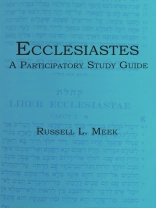What is wrong with the author of Ecclesiastes? Why is there a book in the Bible that tells us that all is vanity? Who is the author?
Ecclesiastes: A Participatory Study Guide is the ninth volume in the Participatory Study Series and the first that is a guide to an Old Testament book.
There has been much controversy about the correct approach to interpreting Ecclesiastes. Is the author clinically depressed? Should you read the book when you’re down in order to find someone who can join you in your misery? Is there anything uplifting in it?
There are some who have thought the book doesn’t belong in the Bible at all. Russell L. Meek takes a different approach. Through a serious study of the language and of the relationship between the text and that of other Bible writers, he discovers a much more positive message. It is still a book that can help you if you’re looking at the troubles and problems of the world. But it is more than a place to find a companion in misery.
In its text you can find help from someone who knows the way out, who knows how a person of faith, even if that faith is tried to the breaking point, can find enjoyment and rest in God. Its six lessons are thematic, covering issues such as the date, authorship and literary context of the book, the meaning of the key Hebrew word hebel, traditionally translated ‘vanity, ‘ the theme of death in Ecclesiastes, the way the author makes use of other scriptural text and why this is important to our understanding of the book, injustice, and how we should respond to the troubles of life.
It is not just a theoretical study, but always examines how this Bible book can guide us in our lives. This study guide continues the tradition of the Participatory Study Series by helping to model different techniques and approaches for Bible study. The author doesn’t just tell you what the text means; he shows you how to discover this and gives you the opportunity to interact with the Bible text for yourself.
It’s designed for use by small groups, but it is also suitable for individual study. As is the case with each volume in this series, it includes pointers to help with your own Bible study and lists of resources to help guide you.







![Обкладинка Brian Schrag & Julisa Rowe: Community Arts for God's Purposes [Chinese] 貼近神心意的社群藝術 Обкладинка Brian Schrag & Julisa Rowe: Community Arts for God's Purposes [Chinese] 貼近神心意的社群藝術](https://static.worldofdigitals.com/thumb_webp/740/9781645083740.webp)




